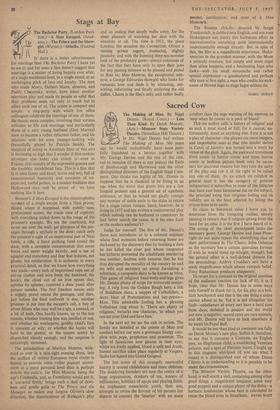Stags at Bay
The Bachelor Party. (London Pavi- Iion.)—A Man Escaped. (Acad- emy.)—The Prince and the Show- girl. (Warner.)—Othello. (Festival Hall.) IF there is a better advertisement for marriage than The Bachelor Party I have yet to see it; and for once a film doesn't suggest that marriage is a matter of living happily ever after, at a single emotional level, in a single mood, at an unchanging pitch of love and loyalty. The men who made Marty, Delbert Mann, director, and Paddy Chayevsky, writer, have taken another television play and made its people so solid that their problems seem not only to touch but to affect each one of us. The action is compact and simple : a stag-party with which five office colleagues celebrate the marriage of-one of them; the theme, more complex, involving their various attitudes to life and marriage and particularly those of a very young husband (Don Murray) soon to become a rather reluctant father, and his relations with his even younger-looking wife (beautifully played by Patricia Smith). The standard of acting in American films of this sort is becoming so high that I wonder if film-makers anywhere else today can match it—even in France, that country of the expressive gesture and the knobbly, uninhibited face. This is a film that is at once funny and exact, warm and wry, full of unsentimental humanity and moments of un- expected, rueful pathos, in a modest tradition that Hollywood may well be proud of : we have nothing like it here.
Bresson's A Man Escaped is the claustrophobic account of a single escape from a Nazi prison, filmed where it happened with mdstly non- professional actors; the inside view of captivity with everything scaled down to the range of the prisoner's eyesight. We see the courtyard, but never see over the wall; get glimpses of the pas- sages through a spyhole in the door; catch only the prisoner's sight of an impersonal pair of Nazi boots, a rifle, a hand pushing food round the door, with a complete concentration that never bores and never weighs heavily, and a use of squalor and monotony and fear that induces, not gloom, but exhilaration. It is authentic in every practical detail, so that we know how everything was made—every inch of improvised rope out of cut-up clothes and wire from the bedstead, the hooks, the chisel out of an iron spoon that, splinter by splinter, removed a door panel after patient months. The first freedom means only a nightly prowl round the passages, and then, just before the final outbreak is due, another prisoner is put into the escaper's cell, a boy of about fifteen who may well be a spy, a coward, or a bit of both. One hardly knows, up to the last minute, whether trusting him was justified or not, and whether his woebegone, grubby child's face is innocent or wily; or whether the hooks will hold in the plaster, or the unseen sentry be dispatched silently enough; and the suspense is unfailingly sustained.
The introduction of Marilyn Monroe, wide- eyed as ever in a skin-tight evening dress, into the stuffiest of central European royal circles is bound to provide some rather piquant amuse- ment at a more personal level than is perhaps strictly the critic's; for Miss Monroe, being the age's Cinderella, and, as Fauntleroy would put it, a 'universal favrit,' brings such a deal of dewi-
ness and gentle guile to The Prince and the Showgirl as makes one forgive Olivier's slow direction, the theatricalness of Ratbigan's play
and an ending that simply melts away, for the sheer pleasure of watching her deal with the situation at all. The time is 1911, the place London, the occasion the Coronation, Olivier a visiting prince regent, monocled, slightly paunchy, and with the looming deep-sea-monster look of the predatory great—always conscious of the fact that they have only to open their jaws for any passing minnow to be pleased and proud to float in; Miss Monroe, the exceptional min- now, a George Edwardes showgirl who looks for romantic love and finds it by attracting, out- witting, infuriating and finally enslaving the old duffer. Charm is the film's only, and rather badly needed, justification; and most of it Miss Mon roe's.
The Russian Othello, directed by Sergei Youtkevitch, is dubbed into English, and not even Shakespeare can justify this barbarous effort to internationalise something quite internationally understandable enough already. But, in spite of this, the film is a magnificent experience, Shake- spearian in the grandest manner, with the Moor a princely creature, less simple and more regal than often happens, and a fascinating Iago who looks—with his small moustache and rather spaniel expression—a goodnatured and perhaps silly man at first sight, a man who credits his nick- name of Honest lago as stage lagos seldom do.
ISABEL QUIGLY














































 Previous page
Previous page